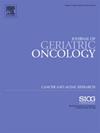Enhancing quality of life in older adults with cancer: Outcomes of a 12-week supervised remote exercise intervention
IF 3
3区 医学
Q3 GERIATRICS & GERONTOLOGY
引用次数: 0
Abstract
Introduction
Exercise in oncology improves health outcomes in patients with cancer. Remote programs offer a promising alternative to in-person sessions, overcoming barriers such as mobility, geography, and treatment-related fatigue. This study assessed the impact of a 12-week supervised remote exercise program on health-related quality of life (HRQOL) as the primary endpoint, and feasibility and acceptability as secondary outcomes in older patients (65+ years) undergoing systemic treatment in Brazil.
Materials and Methods
This is a pilot, single-arm trial (June 2023 to January 2024) of a 12-week remote exercise program for older adults. Participants received individualized aerobic, resistance, and mobility exercises, completed at home. The program was facilitated through WhatsApp® and the Vedius platform for real-time monitoring and support. Patients were assessed using the Functional Assessment of Cancer Therapy – General and the Edmonton Symptom Assessment System. Linear mixed models were employed. Adherence was measured by the completion percentage of prescribed exercises, and acceptability was assessed via a satisfaction question.
Results
Of 48 patients approached, 41 enrolled (median age 70 years, 56.1 % female). Significant improvements were observed in HRQOL (baseline: 83.2; post-intervention: 94.4, P = 0.001). Symptom reductions included pain (1.6 to 0.7, P = 0.001), fatigue (3.8 to 1.3, P = 0.001), nausea (0.8 to 0.2, P = 0.01), depression (2.6 to 0.8, P = 0.001), anxiety (3.2 to 1.2, P = 0.001), and drowsiness (1.8 to 0.4, P = 0.001). Notably, 87.8 % of patients adhered to the prescribed exercise program, and reported high satisfaction, particularly with its convenience and flexibility.
Discussion
A 12-week remote exercise program is feasible and acceptable for older patients with cancer. High adherence and satisfaction suggest that remote exercise interventions can improve HRQOL and symptom management, offering a low-cost, accessible solution for cancer care in resource-limited settings. Future studies should explore long-term outcomes and integrate exercise with other supportive care services.
提高老年癌症患者的生活质量:12周监督远程运动干预的结果
在肿瘤学中锻炼可以改善癌症患者的健康结果。远程程序提供了一个有希望的替代面对面的会议,克服障碍,如流动性,地理位置和治疗相关的疲劳。本研究评估了在巴西接受系统治疗的老年患者(65岁以上)中,12周监督远程锻炼计划对健康相关生活质量(HRQOL)作为主要终点的影响,以及作为次要结局的可行性和可接受性。材料和方法这是一项针对老年人的为期12周的远程锻炼计划的试点单臂试验(2023年6月至2024年1月)。参与者接受个性化的有氧、阻力和活动训练,在家中完成。该计划通过WhatsApp®和Vedius平台进行实时监控和支持。使用癌症治疗功能评估-一般和埃德蒙顿症状评估系统对患者进行评估。采用线性混合模型。通过规定运动的完成百分比来衡量依从性,通过满意度问题来评估可接受性。结果48例患者中,41例入组(中位年龄70岁,56.1%为女性)。HRQOL有显著改善(基线:83.2;干预后:94.4,P = 0.001)。症状减轻包括疼痛(1.6 - 0.7,P = 0.001)、疲劳(3.8 - 1.3,P = 0.001)、恶心(0.8 - 0.2,P = 0.01)、抑郁(2.6 - 0.8,P = 0.001)、焦虑(3.2 - 1.2,P = 0.001)和嗜睡(1.8 - 0.4,P = 0.001)。值得注意的是,87.8%的患者坚持了规定的运动计划,并报告了很高的满意度,特别是它的便利性和灵活性。对老年癌症患者来说,为期12周的远程锻炼计划是可行和可接受的。高依从性和满意度表明,远程运动干预可以改善HRQOL和症状管理,为资源有限的癌症护理提供了一种低成本、可获得的解决方案。未来的研究应该探索长期结果,并将运动与其他支持性护理服务结合起来。
本文章由计算机程序翻译,如有差异,请以英文原文为准。
求助全文
约1分钟内获得全文
求助全文
来源期刊

Journal of geriatric oncology
ONCOLOGY-GERIATRICS & GERONTOLOGY
CiteScore
5.30
自引率
10.00%
发文量
379
审稿时长
80 days
期刊介绍:
The Journal of Geriatric Oncology is an international, multidisciplinary journal which is focused on advancing research in the treatment and survivorship issues of older adults with cancer, as well as literature relevant to education and policy development in geriatric oncology.
The journal welcomes the submission of manuscripts in the following categories:
• Original research articles
• Review articles
• Clinical trials
• Education and training articles
• Short communications
• Perspectives
• Meeting reports
• Letters to the Editor.
 求助内容:
求助内容: 应助结果提醒方式:
应助结果提醒方式:


